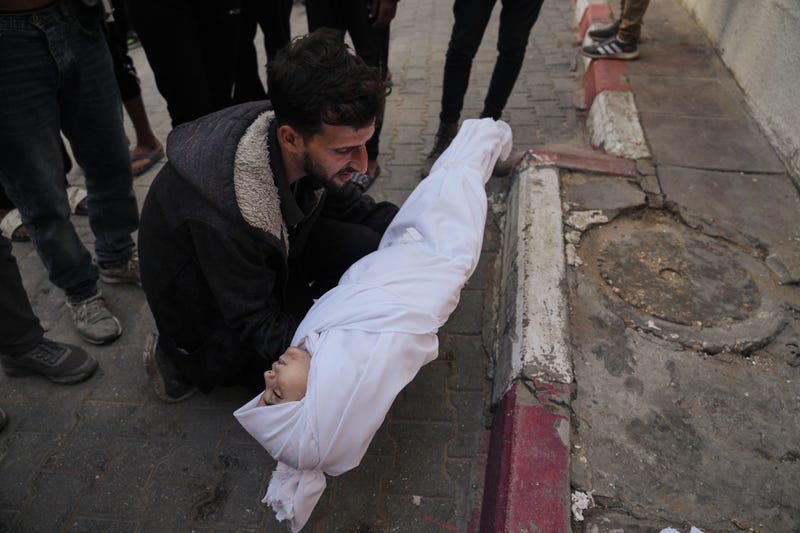
DEIR AL-BALAH, Gaza (AP) — Israeli strikes in Gaza’s southern city of Khan Younis early Thursday killed five people, hospital officials said, bringing the death toll from airstrikes in the Palestinian territory over a roughly 12-hour period to 33, mostly women and children. The strikes have been some of the deadliest since Oct. 10 when a U.S.-brokered ceasefire took effect.
The renewed escalation came after Israel said that its soldiers had come under fire in Khan Younis on Wednesday. Israel said that no soldiers were killed and that the military responded with strikes.
Four Israeli airstrikes on tents sheltering displaced people in Khan Younis late Wednesday and early Thursday killed 17 people, including five women and five children, according to officials at Nasser Hospital.
In Gaza City, two airstrikes on a building killed 16 people, including seven children and three women, according to officials at the Al-Shifa hospital in the northern part of the city where the bodies were taken.
The Hamas militant group condemned the Israeli strikes as a “shocking massacre.” In a statement, Hamas denied firing toward Israeli troops.
Palestinians mourn loved ones
At Nasser Hospital, scores of people gathered to offer funeral prayers for those who were killed in the Israeli strikes. Women wailed in mourning over the bodies of loved ones wrapped in white burial shrouds.
Abir Abu Moustapha lost her three children – aged 1, 11 and 12 -- and her husband in a strike that hit their tent Wednesday. She squatted beside their bodies as they were prepared for burial.
“My children are gone. What can I say? And my husband, my most precious. May God have mercy on them,” Abu Moustapha said. “What was my children’s fault that they had to die? What was their fault that they died in front of my eyes?”
The Israeli military said their strikes were targeting two Hamas figures, one who was a commander in the group’s naval unit and another in charge of tunnels in parts of Khan Younis.
Ceasefire again under pressure
Hospital officials said that the bodies came from both sides of a line established in last month’s ceasefire. The boundary splits Gaza in two, with about 50% of the territory under military control.
The strikes came shortly after the U.N. Security Council gave its backing to U.S. President Donald Trump’s blueprint to secure and govern Gaza. The plan empowers an international force to provide security in Gaza, approves a transitional authority and envisions a possible future path to an independent Palestinian state.
But there are still questions over how the plan will be implemented, especially after Hamas rejected it. The militant group said that the force’s mandate. which includes disarmament, “strips it of its neutrality, and turns it into a party to the conflict in favor of the occupation.”
Israeli strikes have decreased since the ceasefire agreement took effect, though they haven’t stopped entirely.
Gaza’s Health Ministry, which doesn’t distinguish between civilians and combatants, reported more than 300 deaths since the truce began. Each side has accused the other of violating its terms, which include increasing the flow of aid into Gaza and returning hostages — dead or alive — to Israel.
Israel’s campaign in Gaza has killed more than 69,000 Palestinians since it was launched more than two years ago for Hamas’ Oct. 7, 2023 attack on southern Israel. In that attack, militants killed around 1,200 people and abducted 251 others. Gaza’s Health Ministry, part of the Hamas-run government and staffed by medical professionals, maintains detailed records seen as a reliable estimate by the U.N. and many independent experts.
Under the ceasefire that began on Oct. 10, Hamas released the last 20 living hostages in return for hundreds of Palestinians imprisoned by Israel. Hamas has also returned the remains of 25 dead hostages, and still is return three more.
Israeli hostage says he was abused
An Israel hostage freed under the ceasefire deal said he was sexually abused in Hamas captivity.
Speaking to Israel’s Channel 12 News, Guy Gilboa-Dalal said that after he was allowed to shower, one of his captors took him into a room and threw him onto a chair while he was still undressed.
“He started touching my whole body. I froze. I told him: ‘You’re kidding aren’t you? This is forbidden by Islam,’” Gilboa-Dalal said in a clip released by the TV station. “He put a rifle to my head and a knife to my throat. He told me that if I told anyone about this, he would kill me.”
The full interview is to be broadcast on Saturday. Hamas officials did not immediately reply to requests for comment on the claims.
Another male hostage released the same day, Rom Braslavski, has also reported being sexually abused in captivity.
Released Palestinians who had been seized from Gaza during the war and held in Israeli prisons have reported being stripped down to their underwear, subjected to frequent beatings by guards, as well as sexual abuse, being bound for days, causing infections that led to amputations of limbs in some cases, and insufficient food or medical care.
___
Find more of AP’s Israel-Hamas coverage at https://apnews.com/hub/israel-hamas-war